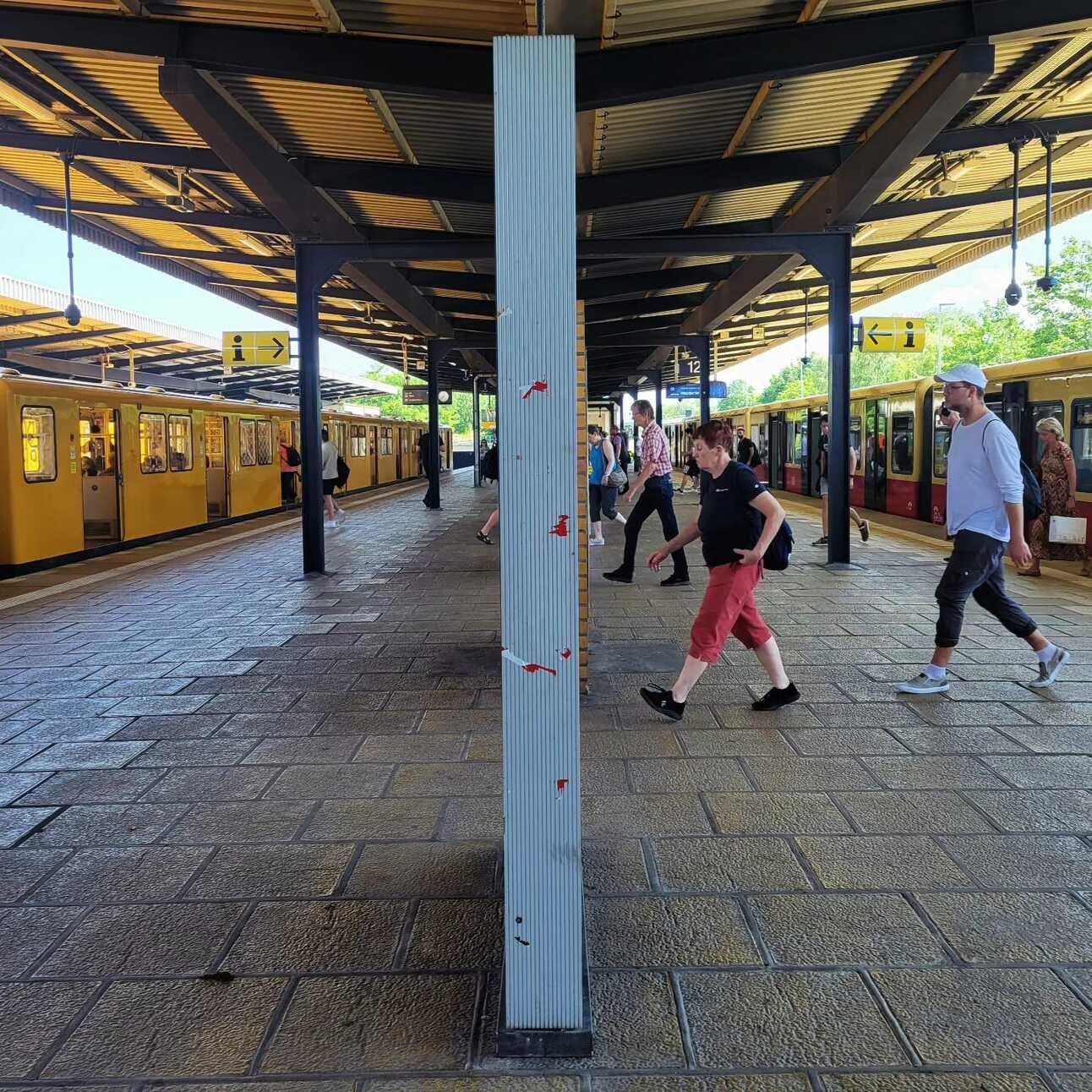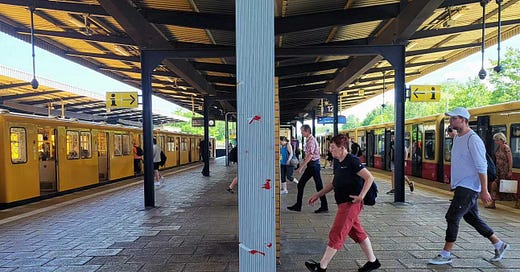
Back on Track? Not so fast.
GDL ended its six-day strike against Deutsche Bahn early Monday, but drivers for Berlin's bus, subway and trams plan to strike on Friday.
Train drivers returned to work at Deutsche Bahn at 2 a.m. Monday morning, after agreeing to end their record six-day labor action sixteen hours earlier than planned.
For us, this meant my daughter could take her normal two trains and a bus to school in the morning, instead of one (longer, slower) subway and a bus.1 We are a car-free family. My husband normally bikes to his office and client locations. My son takes the local bus to his school, and I walk, bike or take the train wherever I need to go. My daughter takes the Berlin S-Bahn - which is operated by Deutsche Bahn - to get to her school on the other side of the city. My husband had to cancel a planned business trip to Stuttgart during the strike, but he was able to join the meeting by video conference, instead.

Our experience appears to echo that of rail passengers across the country, who either used other transit options (like our local ‘Öffi’ BVG), worked remotely, or got in their cars and drove.
The effect of the strike on local services varies from region to region, with many regional, urban and suburban services operated at least partially by private companies such as National Express or Eurobahn.
In the western state of North Rhine-Westphalia, for instance, just over half (42) of regional services were running as normal while 41 services were affected by strike action. However, even unaffected services could be impacted by strike action affecting DB infrastructure.
In Hamburg, traffic coordinators reported an increase in motorway traffic jams as morning commuters took the Autobahn.
A survey conducted by YouGov found that most people did not feel a significant impact to their daily lives as a result of the strike, in contrast to predictions in international media that it would bring Germany to a standstill.
Only one in five respondents felt the current restrictions on rail transport. For more than 75% of those polled, on the other hand, the strike has had no impact.
Deutsche Bahn’s freight business likely took the biggest hit.
In addition, the impact of the freight transport strike is set to be felt even afterward in the form of traffic disruptions. After the last freight transport strike, it took days for the traffic jams to clear up. Deutsche Bahn is forecasting a loss of around €25 million per day for the company alone.
The train drivers’ union (GDL, it stands for Gewerkschaft Deutscher Lokomotivführer) struck DB after failing to reach an agreement on wage and working-hour changes.
GDL wanted a reduction in weekly working hours from 38 hours per week to 35, without a reduction in pay. And, they asked for a salary increase of 555 euros per month, to keep pace with inflation, plus a one-time payment of 3,000 euros to offset the impact of inflation in recent years.
The railway countered with a slightly lower pay increase across the board, a lower inflation bonus, with an option for drivers to either reduce their weekly hours to 37 or work the full 38 for an additional 2.7 percent increase in salary.
If you’re like me, you may find it hard to sympathize with the drivers. We are pro-labor/pro-worker in my house. But most people I know were lucky to get a raise at all this year, and not the 18 percent increase in starting pay that the union wanted.
And a 37-hour workweek hardly seems like sweatshop conditions. They really need a weeklong walkout over what amounted to two hours a week and a couple hundred dollars a month?
But then I read this:
For a year when every third Deutsche Bahn passenger was delayed, a select few bosses at the international company will receive hefty 5-million-euro bonuses, new reports by NDR, WDR and Süddeutsche Zeitung have revealed.
Performance bonuses. The same company that has seen record numbers of cancellations and delays this year - delays often caused because of malfunctioning switches or signals on infrastructure it owns - that is millions of euros in debt and wants millions from the federal government to help offset costs to improving its outdated systems - is paying its top management millions in bonuses.
Bonuses are meant to be an award for good performance. But many long-suffering rail customers will be scratching their heads in amazement and wondering how that's possible, given Deutsche Bahn's long list of problems.
The trick, it appears, is to offset areas in which targets have been missed against other areas in which targets have been exceeded. It means the basic salaries of the nine members of the executive will rise from a total of around €4 million to around €9 million in 2022.
According to the report, Deutsche Bahn only slightly exceeded its own targets in the area of "women in leadership and employee satisfaction" in 2022. However, the bonus was up by 175%, says the report. The executive board members stand to rake in around €1.6 million for this target alone.
The documents also show that Deutsche Bahn exceeded its self-imposed target for CO2 savings by 2%, the investigative network reported. CEO Richard Lutz, for example, is said to have received almost €440,000 in bonus payments.
If management believes the company’s performance justifies such hefty bonuses, I can’t fault the GDL for insisting that the drivers doing the actual *performing'* share in the wealth.
It does appear as if Deutsche Bahn leaders, as GDL chief Claus Weselsky memorably put it: “preach water and drink wine.”
It’s also worth noting that the union has already reached contract agreements with all of its other operators. The leaders cannot in good conscience negotiate a contract with Deutsche Bahn with significantly worse terms than its drivers working for Abellio, for example.
Ultimately, though, it doesn’t matter what I or any other passengers think. Deutsche Bahn2 cannot operate trains without drivers - and they operate with a shortage of drivers as it is. Under German law, employees have a right to organize and to labor actions, including strikes, as part of the collective bargaining process.
Two different courts upheld the most recent strike as a legitimate action.
Now that the most recent strike is officially over, both sides say they will resume negotiations on February 5. The union has promised that it will not call any more strikes before March, at the earliest.
An agreement may still be far off - in 2015, it took eight rounds of warning strikes - including one that lasted five days - before a deal was reached.
Thank you for reading Alte Frau, New Life. This post is public so feel free to share it.
Now it’s BVG’s turn
Verdi - the union that represents employees of the Berliner Verkehrsbetriebe - has called for a warning strike on Friday.
I was just about to put this issue to bed (a.k.a. hit the publish button), when my husband texted to let me know that the drivers for our local transit association, BVG, would strike on Friday.
According to the Berlin government website, the strike will take place all day Friday, not just in Berlin but in local transportation companies all over Germany.
"Since collective bargaining has now taken place in all federal states and has not produced any results, now is the time to put more pressure on employers," said Verdi's deputy federal chairwoman, Christine Behle. Passengers will once again face significant restrictions this Friday, especially in rush hour traffic.
There had been rumors of a Verdi strike for several days, with some speculating that they might strike at the same time as the GDL - which really could paralyze the city.
Fortunately, that’s not the case.
According to the news site RBB24, the Verdi workers are seeking:
longer rest periods between shifts,
an increase of the turnaround time on routes to 10 minutes,
reducing the number of unpaid breaks
increasing the number of annual holidays to 33 for all employees without staggering
and granting employees one holiday from work for every 100 hours of night-shift work.
I am not at all surprised to see the Verdi strike. BVG3 has been struggling to hire enough drivers and recently announced it will be cutting down a number of bus routes and reducing the frequency of others due to the lack of drivers.
I hope the strike will not be for long and that they can reach an agreement quickly.




